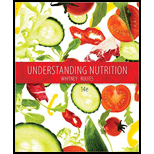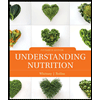
Concept explainers
What are the arguments for obtaining antioxidants from foods, supplements, or both?
To mention: The arguments for obtaining antioxidants from foods, supplements, or both.
Concept introduction: Nutrients are substances that are essential for the maintenance of life. Dietary supplements meet the needs of the body nutrients which are not obtained from the diet. Antioxidants are molecules that destroy the free radicals and maintain the body in healthy conditions.
Explanation of Solution
Antioxidants are molecules that quench the free radicals. Diet is a good source of antioxidants and nutrients, if taken in a balanced quantity. Fruits and vegetables are good sources of antioxidants that are associated with the diminished risk of many chronic diseases. Many dietary supplements are harmful such as beta-carotene, which has increased the risk of lung cancer and mortality in smokers. Selenium posed the diabetes risk and vitamin E posed the risk for prostate cancer as well as strokes. Supplement contents are limited, yet in the fruits and vegetables the phytochemical that acts as antioxidants are numerous. Taking too much of antioxidants as supplements can harm, because in high concentration it acts as a prooxidant and stimulate the free radical formation, and also affects the metabolism process. Therefore, it is advisable to get antioxidant from the regular diet instead of the dependency on supplements.
Want to see more full solutions like this?
Chapter 11 Solutions
LMS Integrated for MindTap Nutrition, 1 term (6 months) Printed Access Card for Whitney/Rolfes Understanding Nutrition
 Understanding Nutrition (MindTap Course List)Health & NutritionISBN:9781337392693Author:Eleanor Noss Whitney, Sharon Rady RolfesPublisher:Cengage LearningSurgical Tech For Surgical Tech Pos CareHealth & NutritionISBN:9781337648868Author:AssociationPublisher:Cengage
Understanding Nutrition (MindTap Course List)Health & NutritionISBN:9781337392693Author:Eleanor Noss Whitney, Sharon Rady RolfesPublisher:Cengage LearningSurgical Tech For Surgical Tech Pos CareHealth & NutritionISBN:9781337648868Author:AssociationPublisher:Cengage- Case Studies In Health Information ManagementBiologyISBN:9781337676908Author:SCHNERINGPublisher:Cengage





